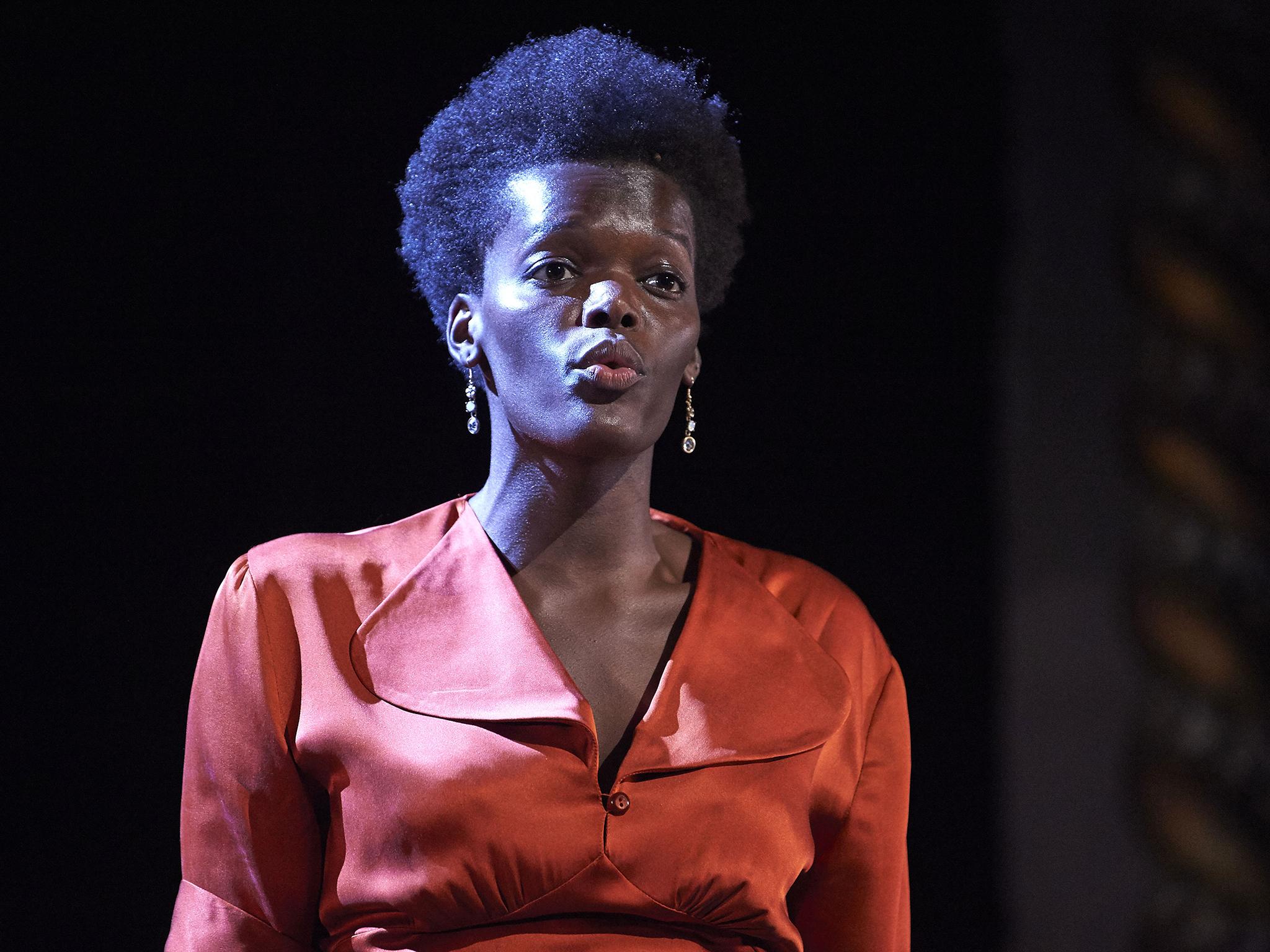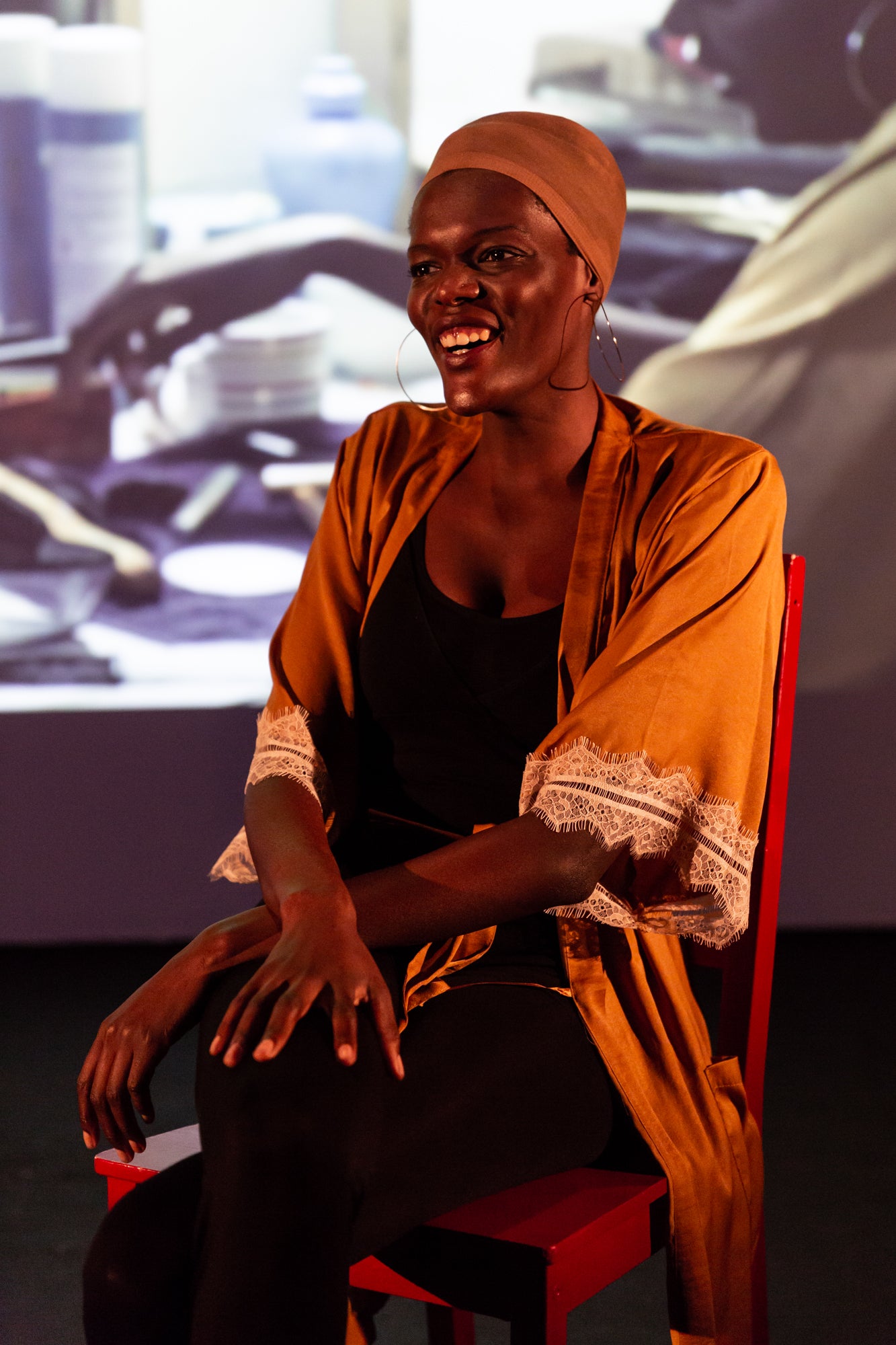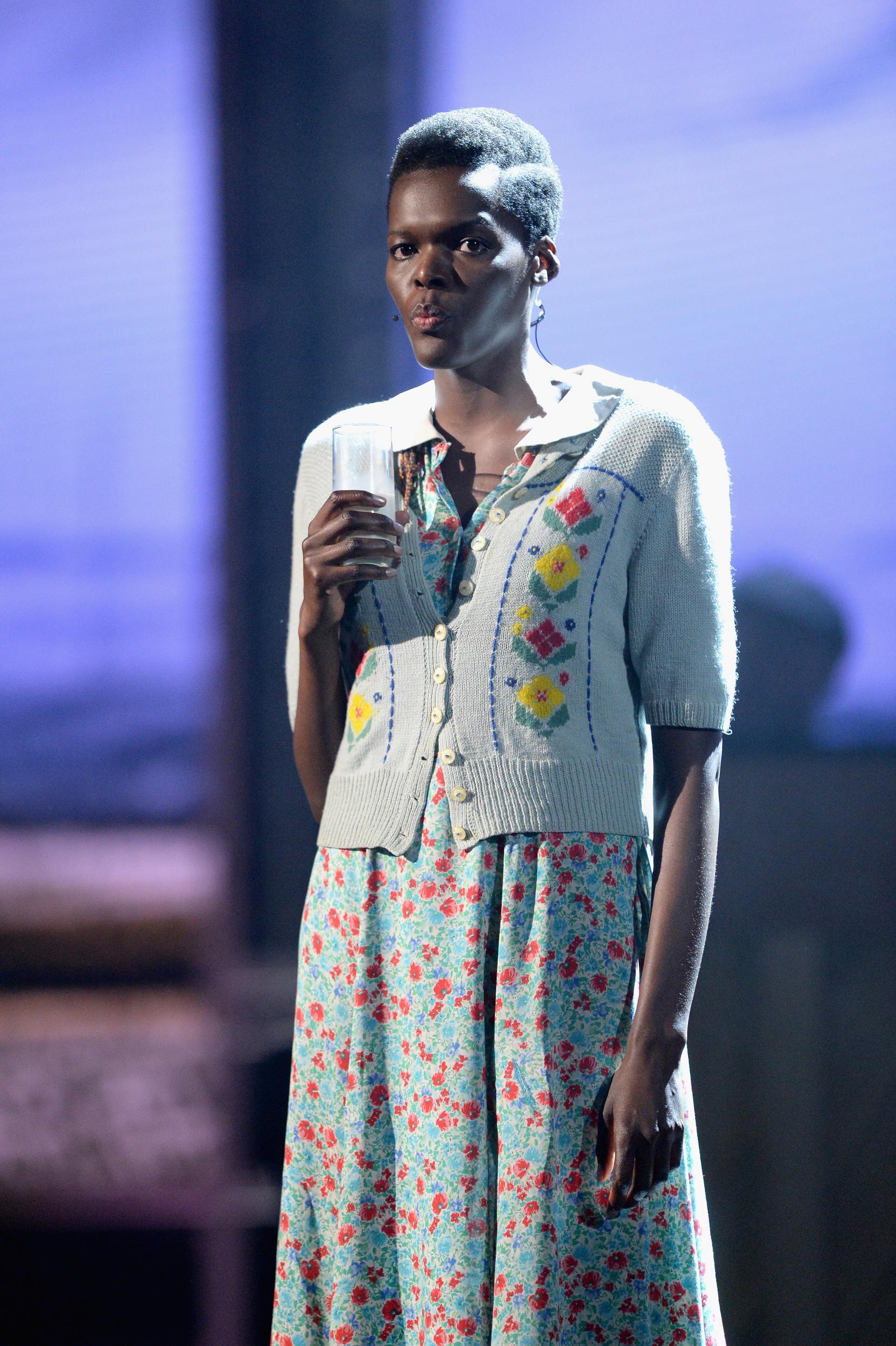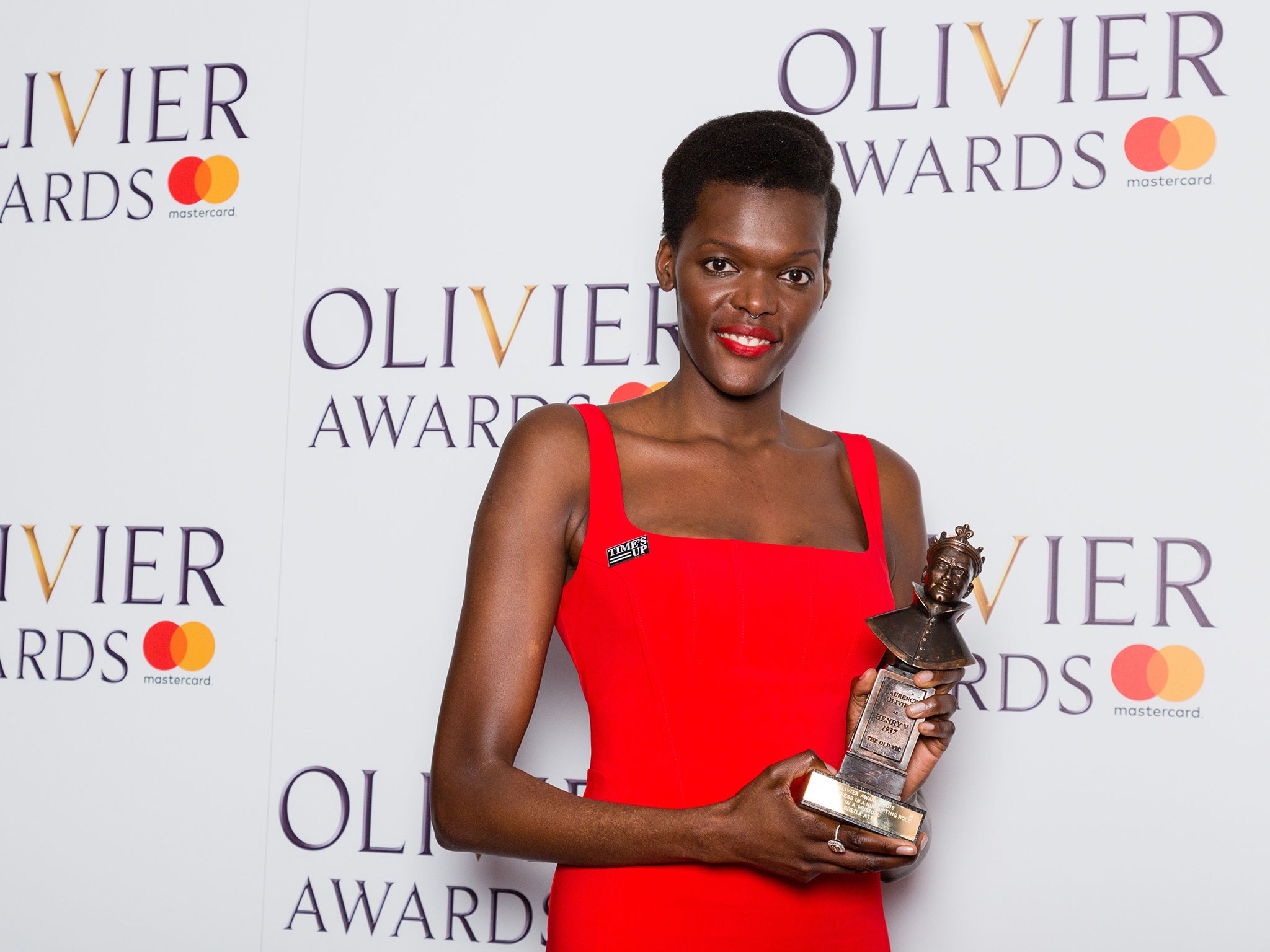Sheila Atim interview: ‘Those excluding people of colour are robbing themselves – they just don’t realise it’
The multi-talented, Olivier award-winning actor talks to Holly Williams about composing music for her latest play 'Time is Love' – and rejects the idea that the rise of black artists is down to box-ticking

Last year was a huge one for Sheila Atim. She won an Olivier award for her performance in Conor McPherson’s Girl from the North Country, having dissolved audiences with her heavenly rendition of Bob Dylan’s “Tight Connection to My Heart”; she impressed as Limehouse Nell in ITV’s Harlots; and she played Emilia opposite Mark Rylance’s Iago in Othello at the Globe, where she unleashed a fury that blew the greatest actor of his generation off the stage.
Atim has carried that momentum into 2019. While most of London was nursing a hangover on 1 January, she was in the first preview of Che Walker’s Time is Love at the tiny Finborough theatre in west London. Atim plays Rosa, a Los Angeles lap dancer mixed up in a seedy underworld of love and violence, sex and betrayal. But she doesn’t just star in the play – she also composed all its sound and music.
It was nerve-wracking, hearing her own compositions while also acting onstage. “I realised afterwards I didn’t really breathe for the whole thing,” she says the morning following the show, when we meet in a Peckham cafe close to where she lives.
Still, this level of multi-tasking – or overachieving, if you were feeling especially green-eyed – is typical of Atim’s career. She acts, she sings, she writes songs, she plays four instruments (piano, violin, bass and drums). Prior to her acting career, she had a stint as a model – hardly a shock; Atim is 5ft 11 of long limbs and sharp cheekbones – but also got a degree in biomedical science at King’s.

It all feeds her, she explains, the science as much as the art. “I understand that as human beings we like to categorise things, because it’s easier to find a slot that we fit into. But I resisted that – not as an ideological theory, but because I didn’t want to miss out on stuff! I don’t like the segregation [of arts and sciences]. I always rebelled a little bit.”
Raised by her mother, who moved to the UK from Uganda when Atim was five months old, she’s always been supported in her creative pursuits. “She was the one paying for my piano lessons, coming to school shows. I’m much more subdued and boring now, but I was a little performer as a child – it was very clearly there.”
Even so, she adds that her mother, “who worked bloody hard” and became a commissioner for the NHS, was a touch nervous when her daughter opted for a career in the arts: “She was just worried in the way a parent – especially a woman, coming from Uganda – would be: Are you going to be OK? Are you going to be able to eat? I can eat, mum!”
In fact, Atim – who’s just turned 27 – seems to have a smorgasbord of career opportunities in front of her. She’s often asked whether she’ll record an album, but comments blithely that she “didn’t want to just go off and sign a record deal because I don’t want to be tied into anything yet – I want to see what’s out there”.
Time is Love, however, is in some ways a project Atim has been preparing for a long time. She first met Che Walker, who also directs the play, when she was still at school. He ran weekend classes at Wac Arts, an inclusive performing arts training centre in Belsize Park, north London, and often works with former pupils: alumni also include Michaela Coel and Arinze Kene, who starred recently in the Netflix film of Walker’s hit musical Been So Long.

Although Atim initially signed up for singing, she ended up in Walker’s acting classes too, and the pair hit it off. He later gave Atim her professional debut in his 2013 play The Lightning Child at the Globe. But even in the early days, he spotted her creative potential, getting her to compose music for end of term shows.
“He’s a great friend and my mentor,” she says. “Not many people know me as well as he does. And not many people would say ‘yeah go on – write the music and be the sound designer’. That, in turn, emboldens me when stepping into new territory.”
Time is Love is not a musical – Atim is very clear about that, but “because of my link with singing everyone thinks I’ve written a full-on Sondheim,” she adds with a laugh. Her compositions are largely atmospheric soundscapes, as well as some bass-heavy, hip hop-inflected moments, aiming to evoke an LA underworld (Walker moved to LA a few years ago, and the play premiered there last year).
“Che and I created a playlist of references, but they’re all completely different songs – it wasn’t ‘here’s the sound I want’ but ‘here’s the feeling I want’. You’ve got Stan Getz in there, and Kendrick Lamar. One thing we talked about a lot in rehearsals is LA and earthquakes, and the parallels with the rumbling in us as characters – the things bubbling under the surface.”
Atim pauses, and then adds simply “I’ve gotta say, I’m pretty proud of it actually. I really went for something, and have done it as well as I could at this point of my life.”

The gritty urban milieu of contemporary LA may be far from the Depression-era Minnesota of Girl from the North Country, but Atim credits her immersion in Dylan’s music with giving her own work a step up. “My songwriting was really changed by that show, because I was being influenced by one of the greatest songwriters of all time,” she says.
Her performance was truly star-making, and the recognition of it has changed Atim’s life. She has said in a previous interview that her height and her race have prevented her from playing the “love interest” roles – is that still the case?
“I don’t know,” she replies, adding with characteristic calm that the point of the glass ceiling is that you don’t see it till you hit it. Her career may seem charmed right now, but she brings up a round-table discussion she watched recently on YouTube, where Angela Bassett and Sandra Oh pointed out that, as actors of colour, they are still not even considered for “sexy” roles. She’s wary of assuming that she’s successful enough not to face prejudice (even if unconscious) when it comes to casting.
Last year has been hailed as the one that British theatre finally diversified, with a wealth of hit plays by black artists, and several key artistic director roles going to people of colour. But from the inside, does it feel like real change is actually happening, or is it all just lip service?
“I’m not in the room when those conversations happen,” she says, before pausing to weigh her words. “I think in some areas the change is genuine; I think in some areas people are scared of not being on the right side of history, but are not actually trying to understand what it means fundamentally and why it’s important. They’re just scared of backlash. And that isn’t helpful for us.”
Some, I suggest, may even be aggrieved – you do hear private moans about the fact that there are no longer opportunities for established white men…
Atim groans in recognition. “Oh my god I’ve met so many [people like that]. I have met so many. A consequence of forward moving is the pull back, the resistance. It is difficult.” She sees friends doing brilliantly in careers, and then notices their success being undercut by insinuations that it is based on box-ticking rather than talent.
This is a short-sighted view, she argues. “We know that when you create a more diverse working environment everyone benefits from that. The people doing the excluding may think that they are making a personal gain for themselves but they’re not,” she points out. “They are robbing themselves – they just don’t realise it.”
Time is Love is at the Finborough Theatre till 26 January, finboroughtheatre.co.uk
Join our commenting forum
Join thought-provoking conversations, follow other Independent readers and see their replies
Comments
Bookmark popover
Removed from bookmarks